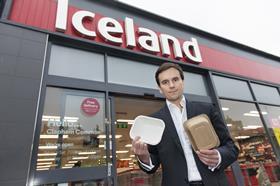
Supermarket chain Iceland has pledged to eliminate plastic packaging from all of its own brand products by the end of 2023.
The frozen food specialist said the transition will affect more than 1,000 own-label products, including fresh and frozen fruit and vegetables.
New ranges will be packaged in paper, pulp trays, and paper bags instead of plastic, and the new packaging will be fully recyclable through domestic waste collection or in-store recycling facilities, the supermarket confirmed.
The move follows the government’s recently-announced ambition to eliminate all avoidable plastic waste within 25 years, through policies such as plastics-free aisles in supermarkets and potentially taxing the use of single-use plastic containers.
In fresh produce there have also been recent outcries over the packaging of cauliflower 'steaks' and film-wrapped coconuts.
In a 2017 OnePoll survey of consumer attitudes to plastic 80 per cent of adult consumers said they would endorse a supermarket’s move to go plastic-free, and nearly 68 per cent thought other supermarkets should follow this lead.
Iceland said it will be providing regular updates on key milestones over the next five years as it transitions to plastic-free packaging.
Managing director Richard Walker said: “The onus is on retailers, as leading contributors to plastic packaging pollution and waste, to take a stand and deliver meaningful change.
“Other supermarkets, and the retail industry as a whole, should follow suit and offer similar commitments during 2018. This is a time for collaboration.”
He added: “There really is no excuse any more for excessive packaging that creates needless waste and damages our environment. The technologies and practicalities to create less environmentally harmful alternatives exist, and so Iceland is putting a stake in the ground.”
The environmental toll of plastics was laid bare in David Attenborough’s recently aired BBC series Blue Planet II, and according to Greenpeace, an estimated 12.7 million tonnes of plastic ends up in the world’s oceans every year, endangering marine life from whales to plankton.
There are also fears that toxins originating from plastics are re-entering the food chain via seafood.
Of the 1.5m tonnes of recyclable plastic waste used by UK consumers in 2015 only a third was recycled, according to The Guardian, which cited figures compiled by Co-op from the Recoup UK Household PlasticsCollection survey.
Before making the packaging announcement, Iceland said it had consulted regularly with Greenpeace experts.
The environmental NGO’s executive director John Sauven welcomed the move, saying: “It’s now up to other retailers and food producers to respond to that challenge.”
He added: “The tidal wave of plastic pollution will only start to recede when they [the supermarkets] turn off the tap. They know the scale of systemic change we need, and yet their responses have been timid and piecemeal.
“Iceland has offered a more radical solution that shows the way forward for the sector.”



